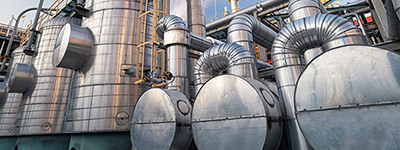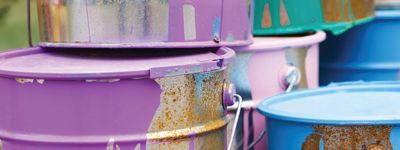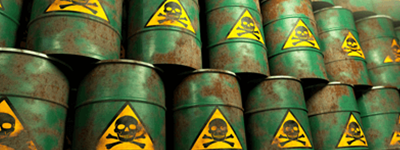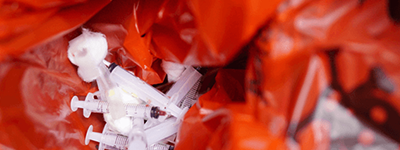Hazardous Waste
Services in South Carolina
Pickup, Transportation and Disposal
For quick pricing, call and talk to an expert
(866) 315-8116
PAY FOR WHAT YOU NEED
No minimum shipments required, no monthly or annual fees. We will charge you only for the waste you generate.
A SINGLE PARTNER
We handle everything, from waste profiles and compliance support to bins, scheduling, transport, disposal and manifest.
LOCAL EXPERTISE
Our drivers and support team have decades of experience, training and certification to identify waste and minimize risk exposure
Waste Management
Expertise in South Carolina
MCF Environmental Services have been serving medical clinics, laboratories, education institutions and local businesses for more than 30 years, offering specialist waste collection and disposal services for hazardous and non-hazardous waste streams.
Any business or facility in South Carolina that produces infectious or hazardous waste is required to know and follow the regulations of the state.
Definitions are important. Infectious waste, also commonly known in the state as biohazardous waste, is commonly produced in healthcare scenarios. Infectious waste is overseen by the Department of Health and Environmental Control (DHEC) through their Infectious Waste Program, which regulates both generators and transporters of such waste.
South Carolina adopted the regulations of the Environmental Protections Agency’s Resource Conservation and Recovery Act (RCRA) so waste generators in the state need to be familiar with its content. The state (44-56-20) of the South Carolina Code of Laws defines hazardous waste as “any waste, or combination of wastes, of a solid, liquid, contained gaseous, or semisolid form which because of its quantity, concentration, or physical, chemical, or infectious characteristics…”
About waste generators
South Carolina defines classification of waste generators by the weight of the waste generated per calendar month. For example, a small quantity generator (SQG) is one that produces less than 50 pounds of infectious waste every month.
A large quantity generator (LQG) can generate anywhere between 50 and 999 pounds per month, and an extra-large quantity generator can generate 1,000 pounds or more per calendar month.
Waste generators are also required to report generation, storage, transportation, treatment, or disposal of hazardous waste to the DHEC. Failure to do so can result in violations and fines up to $25,000 per day until compliance is achieved.
Storage and labeling considerations
Regulations 61 through 79 of the state’s Hazardous Waste Management Regulations provide an extensive listing of hazardous constituents and management standards applicable to generators of hazardous waste. For example:
- Subpart A, Section 262.11- Hazardous waste determination and record-keeping
- Subpart A section 262.12 – Notification requirements upon generators
- Subpart B covers manifest requirements applicable to small and large quantity generators
- Subpart C covers transport requirements of small and large quantity generators including packaging, labeling, marking, and placarding.
- Subpart D covers record keeping and reporting applicable to small and large quantity generators
Avoid guesswork when it comes to infectious or hazardous waste management. Know the laws of South Carolina to maintain compliance. It is the responsibility of the waste generator to comply. Turn to the expertise of MCF Environmental Services for support and experience in medical and industrial waste management practices that focus on safety and compliance.
Waste Collection Services we provide in South Carolina:
Sharps and biomedical waste for healthcare facilities
Pharmaceutical waste and prescription medications disposal
RCRA Hazardous, Chemical waste and Environmental Services
Lab Packs and laboratory waste collection
Dry Cleaning Waste Management
Confidential Document Destruction

Get A Quote
For expert advice on how to manage your waste disposal, contact us for a fast price quote
Please note we do not provide disposal services for household waste
Other Waste Streams We Handle
PHARMACEUTICAL WASTE
Unused, expired or partially used medications; we handle collection of all pharmaceutical waste
CHEMICAL WASTE
From singular to bulk chemical disposal, we can transport and treat all hazardous chemicals
PAINT WASTE
Our expertise covers all solid paint wastes, oily rags, solvents and used absorbents
DRY CLEANING WASTE
We have three decades of experience managing collection and disposal of dry-cleaning waste

ENVIRONMENTAL REMEDIATION
We can provide expert guidance on asbestos, HAZMAT and toxic waste removal
HAZARDOUS WASTE
From waste audits, to profiling, collection and disposal, we handle all RCRA hazardous waste
LAB PACK WASTE
We offer Lab pack services and laboratory waste management including chemical disposal
MEDICAL WASTE
For all sized patient care facilities, we offer disposal solutions for all healthcare waste streams

COVID-19 WASTE
Supporting nursing homes and other patient care facilities in COVID-19 waste disposal
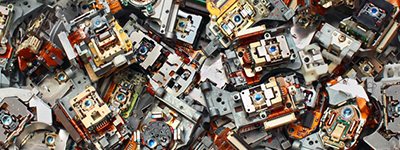
E-WASTE
Our E-Waste recycling and disposal solutions cater for all electronics and computer devices

DOCUMENT DESTRUCTION
When confidentiality matters, we offer recurring and bulk shredding services
South Carolina State Resources
Here are some handpicked resources to help you get up to speed with South Carolina waste management requirements
SOUTH CAROLINA DEPARTMENT OF HEALTH
2600 Bull St.
Columbia, SC
29201
dph.sc.gov | 855 472 3432
SOUTH CAROLINA ENVIRONMENTAL PROTECTIVE AGENCY
Main Regional Office - EPA Region 4
61 Forsyth Street SW
Atlanta, GA 30303
SOUTH CAROLINA DEPARTMENT OF ENVIRONMENT
2600 Bull St.
Columbia, SC
29201
scdhec.gov/environment | 855 472 3432







